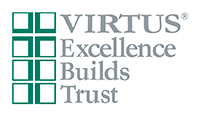By Maureen Smith
JACKSON – The Diocese of Jackson has a new Safe Environment Program in place for all employees and volunteers which uses a monthly email to build awareness and further training for adults who work with children and vulnerable adults. The program, called Virtus, is run by National Catholic Risk Retention Group.
National Catholic was started in the 1980s. A former board chairman, Msgr. Kevin McCoy, asked a simple question that led to the creation of Virtus: can child sexual abuse be prevented and how? The company continues to utilize experts in many disciplines to seek every means of preventing abuse and fostering healing within communities.
“That question is so important in what we are doing today,” said Pat Neal, director of programs for Virtus. “We have seen results with this program in preventing abuse and in healing,” she added. Neal paid a visit to the diocese in March to help get the program online.
The diocese utilizes the monthly training bulletins issued by Virtus. Each volunteer and employee will get an email reminding them to log onto the website to read a short article and answer a question about it. The bulletins are not limited to child sexual abuse. They cover topics as varied as Internet safety, human trafficking, protecting vulnerable adults and more.
“We have experts we work with on a daily basis writing on these topics,” said Neal. “We even hear from Virtus users who may ask a question and we will ask an expert to write on that topic,” she added.
The diocese will still use an initial training program from Praesidium called “Called to Protect,” and will still conduct a criminal background check on all volunteers and employees. Virtus is meant to keep training up-to-date. Virtus’ website explains that the program targets both institutional change and individual behavior modification. “In reading a monthly bulletin, we believe it will help people apply the training (they have received),” explained Neal. The goal is not just to make people aware of the need for a safe environment, but to help them see where they can be part of creating it.
Before he became the bishop of Jackson, Bishop Joseph Kopacz used Virtus in his home diocese of Scranton. He spoke at the listening sessions about how much he admired it and said he feels like the time spent keeping up-to-date on issues of abuse is critical to the success of any child protection program.
“This diocese has always been so proactive when it comes to safe environment,” said Vickie Carollo, coordinator for the Office of Child Protection. “We have always provided not only initial training, but re-training. I think adding ongoing training through Virtus is wonderful,” she added. “I like that the bulletins have different material every month and that they cover a variety of topics. In fact, the subject matter is good not just for volunteers and employees, it’s of interest to our parents as well. These topics are relevant to raising their children,” said Carollo.
She said she appreciates all the work the schools, parishes and service centers have put into these programs. “It takes all of us working together to provide a safe environment for our children, not only in our churches, but also in our homes and communities. We all play a part in the eradication of child sexual abuse.”
What to do if a child discloses abuse
If a child or young person is attempting to disclose abuse, it is important that you communicate to the child:
It is not your fault.
I believe you.
I am glad that you told me.
I will try and help you.
Abuse is wrong and we take reports of abuse very seriously.
It is important that you DO NOT:
As the child or young person if he or she is telling you the truth.
Promise the child or young person that you will not tell anyone else.
Criticize the abuser, as it may be someone the child cares about.
Express shock or panic.
Qué hacer cuando un menor de edad le informa del abuso:
Si un(a) niño(a) un(a) joven intenta revelarle el abuso es importante que usted le diga lo siguiente:
!No es tu culpa!
Te creo.
Te agradezco que me lo hayas dicho.
Voy a tartar de ayudarte.
El abuso es malo y nosotros tomamos la información sobre el abuso muy en serio.
Es importante que usted no haga lo siguiente:
No le pregunte al niño(a) o al (la) joven si está diciendo la verdad.
No le prometa al niño(a) o al(la) joven que usted no va a decirselo a nadie.
No critique a la persona que cometió el abuso, ya que podría ser que dicha persona sea alguien que es importante para el(la) niño.
No muestre sobresalto o pánico.
